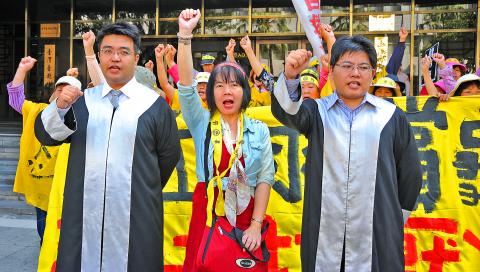Accompanied by several dozen former Hualon Corp workers, Hualon Self-Help Organization president Lee Tsui-ming (李翠明) came to the Taipei District Court for an inquiry session yesterday, over charges of violating the Assembly and Parade Act (集會遊行法) during a demonstration in January.
The workers retired from the bankrupt textiles manufacturer about a decade ago and are claiming an average of NT$1 million (US$33,000) each in unpaid pensions, after a court auction of Hualon’s assets in August provided them with less than NT$3,000 each in compensation.
Lee was summoned for leading an unauthorized demonstration in front of the Presidential Office Building on Jan. 27.

Photo: Liu Hsin-de, Taipei Times
She said the court did not notify her about any illegal behavior until last week, right before another surprise demonstration at the same location, which she said prompted speculation on the government’s judicial influence.
“We launched that [first] demonstration right before the Lunar New Year, because we really did not have any money left to celebrate the holidays,” Lee said. “We were forced to take to the streets for our pensions.”
Clad in signature yellow cloaks with the word “anger” written across their chests, the workers carried a large banner reading: “[The government is] slow as a turtle in providing compensation, while abusive in judicial prosecution.”
Human rights lawyers Chiu Hsien-chih (邱顯智) and Tseng Wei-kai (曾威凱), both volunteering their services for the Hualon case, condemned the court’s use of the Assembly and Parade Act, which they see as a violation of the workers’ rights.
“It always makes me sad to defend social activists, when the court should really be going after murderers or arsonists,” Chiu said.
Chiu also stated his support for the workers’ compensation: “If all the money from the Hualon auctions goes to the banks instead of the workers, I think Taiwanese society will never forgive our judicial system.”
With a pre-approval system that requires organizers to obtain permits from local authorities before rallies or protests, the Assembly and Parade Act has often been described as “a relic from the Martial Law era” by human rights advocates, with many campaigning for its abolition.

Alain Robert, known as the "French Spider-Man," praised Alex Honnold as exceptionally well-prepared after the US climber completed a free solo ascent of Taipei 101 yesterday. Robert said Honnold's ascent of the 508m-tall skyscraper in just more than one-and-a-half hours without using safety ropes or equipment was a remarkable achievement. "This is my life," he said in an interview conducted in French, adding that he liked the feeling of being "on the edge of danger." The 63-year-old Frenchman climbed Taipei 101 using ropes in December 2004, taking about four hours to reach the top. On a one-to-10 scale of difficulty, Robert said Taipei 101

Nipah virus infection is to be officially listed as a category 5 notifiable infectious disease in Taiwan in March, while clinical treatment guidelines are being formulated, the Centers for Disease Control (CDC) said yesterday. With Nipah infections being reported in other countries and considering its relatively high fatality rate, the centers on Jan. 16 announced that it would be listed as a notifiable infectious disease to bolster the nation’s systematic early warning system and increase public awareness, the CDC said. Bangladesh reported four fatal cases last year in separate districts, with three linked to raw date palm sap consumption, CDC Epidemic Intelligence

US climber Alex Honnold left Taiwan this morning a day after completing a free-solo ascent of Taipei 101, a feat that drew cheers from onlookers and gained widespread international attention. Honnold yesterday scaled the 101-story skyscraper without a rope or safety harness. The climb — the highest urban free-solo ascent ever attempted — took just more than 90 minutes and was streamed live on Netflix. It was covered by major international news outlets including CNN, the New York Times, the Guardian and the Wall Street Journal. As Honnold prepared to leave Taiwan today, he attracted a crowd when he and his wife, Sanni,

Taiwanese and US defense groups are collaborating to introduce deployable, semi-autonomous manufacturing systems for drones and components in a boost to the nation’s supply chain resilience. Taiwan’s G-Tech Optroelectronics Corp subsidiary GTOC and the US’ Aerkomm Inc on Friday announced an agreement with fellow US-based Firestorm Lab to adopt the latter’s xCell, a technology featuring 3D printers fitted in 6.1m container units. The systems enable aerial platforms and parts to be produced in high volumes from dispersed nodes capable of rapid redeployment, to minimize the risk of enemy strikes and to meet field requirements, they said. Firestorm chief technology officer Ian Muceus said